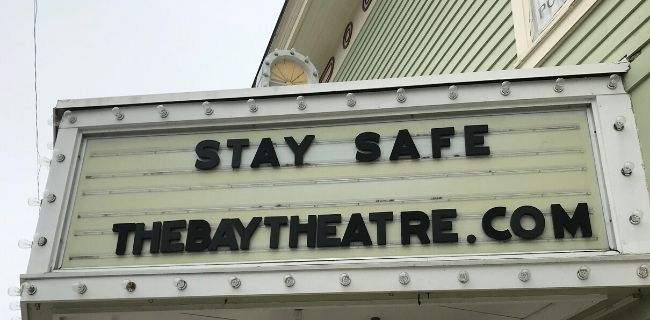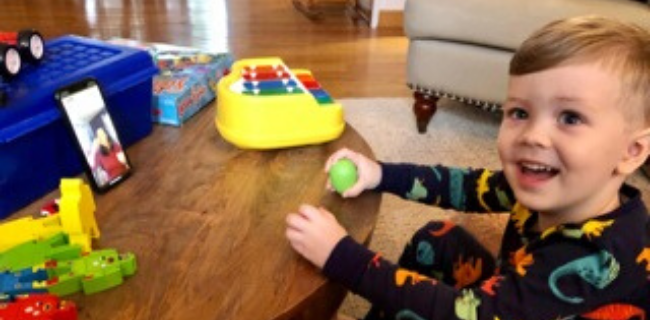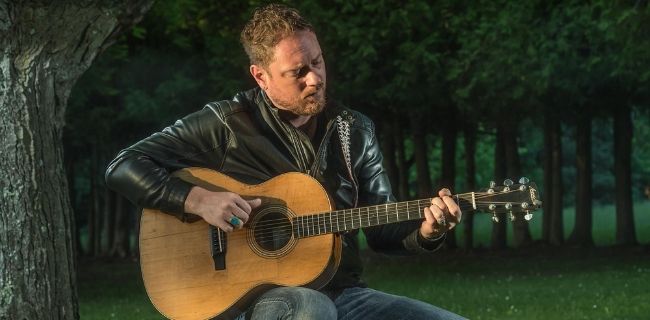Local Arts & Culture Adapt To Quarantine Conditions
Quarantine has forced northern Michiganders to tackle daily life creatively. Employees craft home offices. Restaurateurs offer curbside pickup. Families gather together online.
What about the creatives? What are musicians, theatres, artists, and museums doing to adapt to the “new normal”? Learn how some members of the local arts and culture community are responding to quarantine conditions and why the arts are important now more than ever.
Living Room Concerts
The energy of a live show is irreplaceable. However, when musicians have to take their talents from the big stage to the living room, they can still keep their audiences entertained.
“I miss the element of live music. It’s a little tough to recreate in my living room,” said local musician Levi Britton. “But people say over and over that these living room concerts bring them some normalcy, peace and happiness.”
Britton has been live-streaming concerts for his fans using Facebook and other videoconferencing platforms from home. His fans can watch with friends and family, interact with fellow fans, and give their rounds of applause in the comment section.
“Music is more important now than ever,” Britton explained. “It has the powerful ability to change the way a person feels. And in these times, it makes people feel together.”

Film Study From Your Study
If there is one activity everyone can identify with during quarantine, it’s watching a movie. While the Bay Theatre in Suttons Bay can’t facilitate that activity in-house, they can try to recreate that same sense of community when going to the movies.
“Through our new reimagined programming, we can engage, connect, and support our movie-loving community,” said Larry Domine, board member for the Bay Theatre. “Movies can still bring us together.”
Using video-streaming and conferencing technology, the Bay Theatre has offered online programming, including having patrons view introductions to films by film historians and industry insiders, watch a film on their own, and then participate in a live Q&A session.
“The health emergency has created feelings of fear, abandonment, confusion, and uncertainty,” explained Domine. “The arts boost self-esteem, a feeling of belonging, reduces stress, and promotes creative thinking. It is not just entertainment, but an engaging experience shared with others.”

Tunes For Tykes
The lack of routine and group activities during a quarantine can be especially hard on children. That’s where Christy Burich, director of Music Together of Traverse City, steps in.
“Miss Christy” offers early childhood music and movement programs to local kids and families. While her classes are normally held in person, in the wake of the pandemic, she has successfully moved her programming online.
“I hope to help alleviate some of the anxieties that our young families might be facing and bring a sense of normalcy and routine back for the kids,” explained Burich. “I also hope to inspire feelings of joy and impart the need for all of us to keep our energies light and playful as much as possible!”
Today, Burich offers an eight-week online music course for kids up to 5 years old. The course consists of a combination of live classes in which children and families can interact and prerecorded video and other coursework.
“There has been a tremendous response! The live, interactive classes have been a unique way for children to stay social and for the parents to connect with other adults for moral support,” Burich said.

Bringing Exhibits Home
Museums and galleries could be thought of as hubs of creativity, with everything from art exhibits to concerts. But also, when you think of museums and galleries, you think of the buildings themselves, which are closed during the quarantine.
“The role of 21st century museums is rapidly changing,” explained Craig Hadley, executive director of the Dennos Museum Center. “Connecting people and ideas in new and innovative ways is what we do through the visual and creative arts. Collections and exhibits are critical to this mission, but the human element is undeniably central as well.”
In response to the pandemic, the museum created a number of programs to engage and connect with audiences, including an online concert series, a virtual exhibit featuring young artists, online drawing sessions, and a lot more.
“The Dennos Museum Center is living through this challenging time with everyone else, and we are responding with all of the courageous creativity that we can muster,” said Hadley. “Whether it’s rallying arts organizations in the area to donate medical supplies, or partnering with our peers at Michigan Legacy Art Park, or retooling our “Draw Northern Michigan” program for online art education delivery, our programs extend far beyond the gallery walls and the collection vaults.”



Leave A Comment